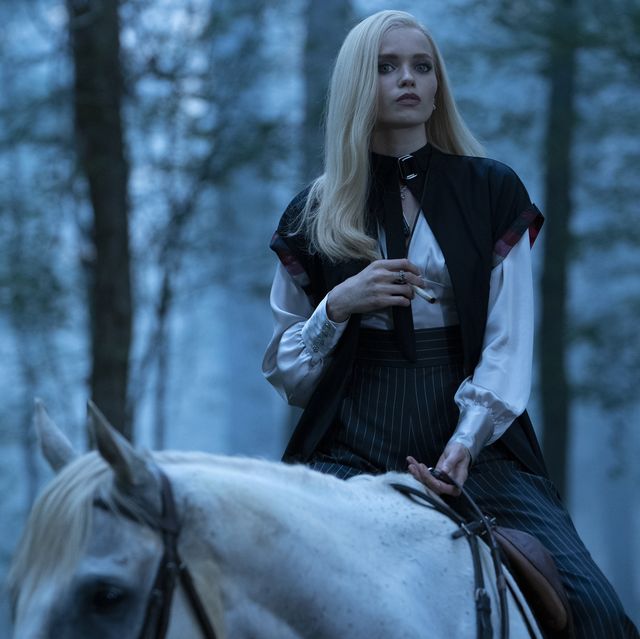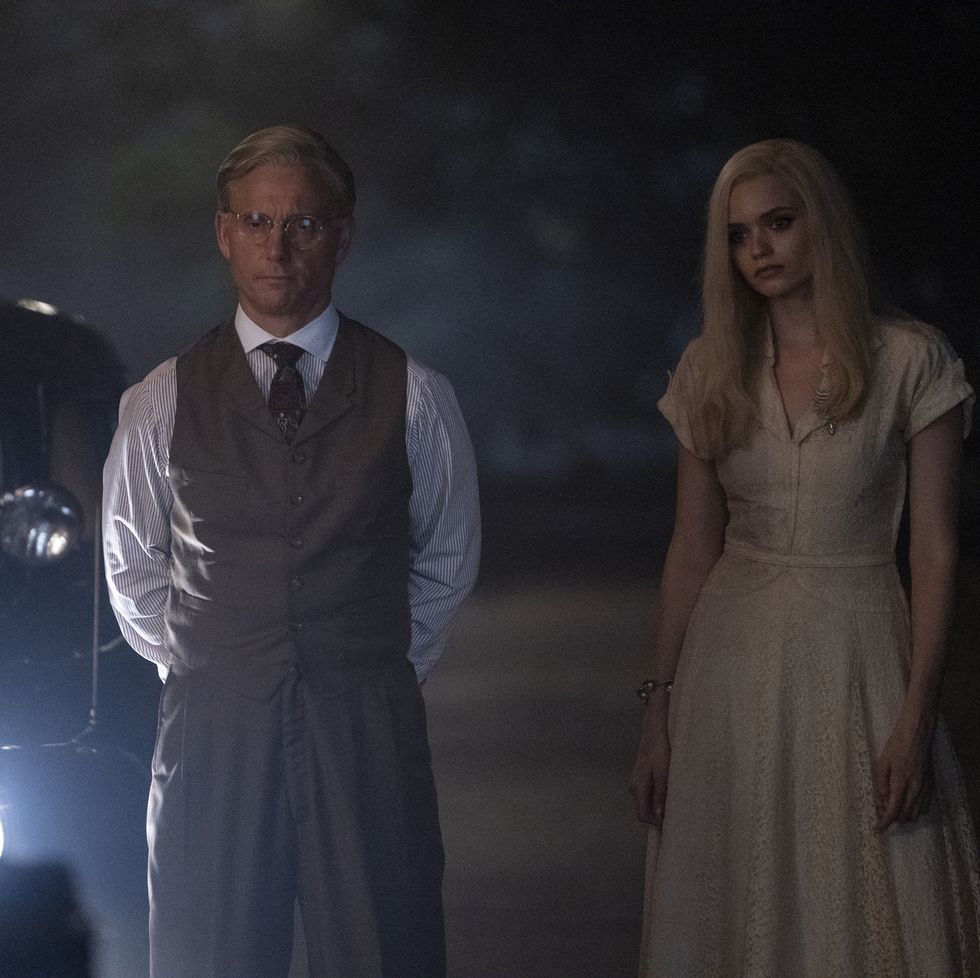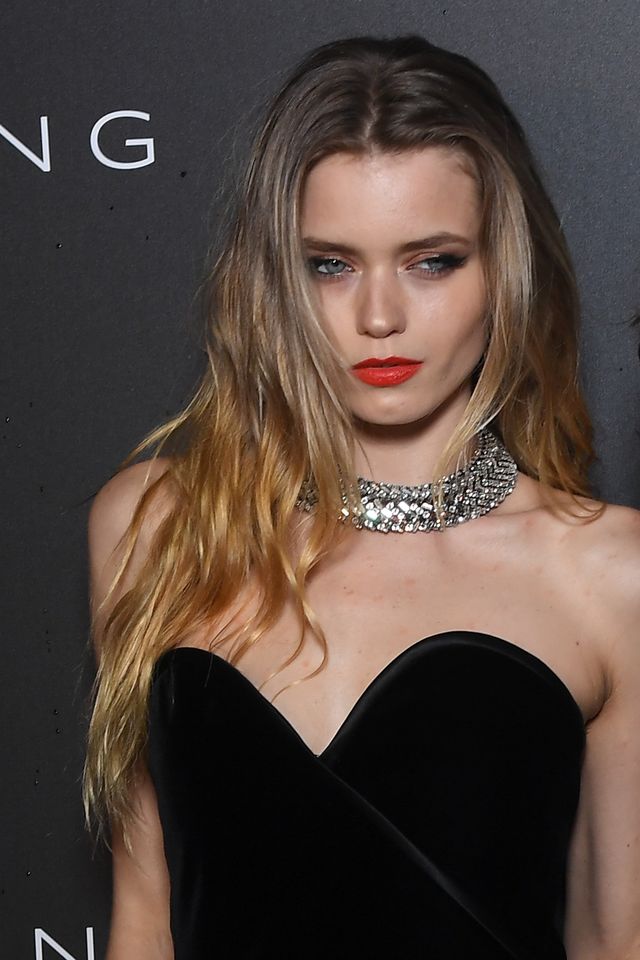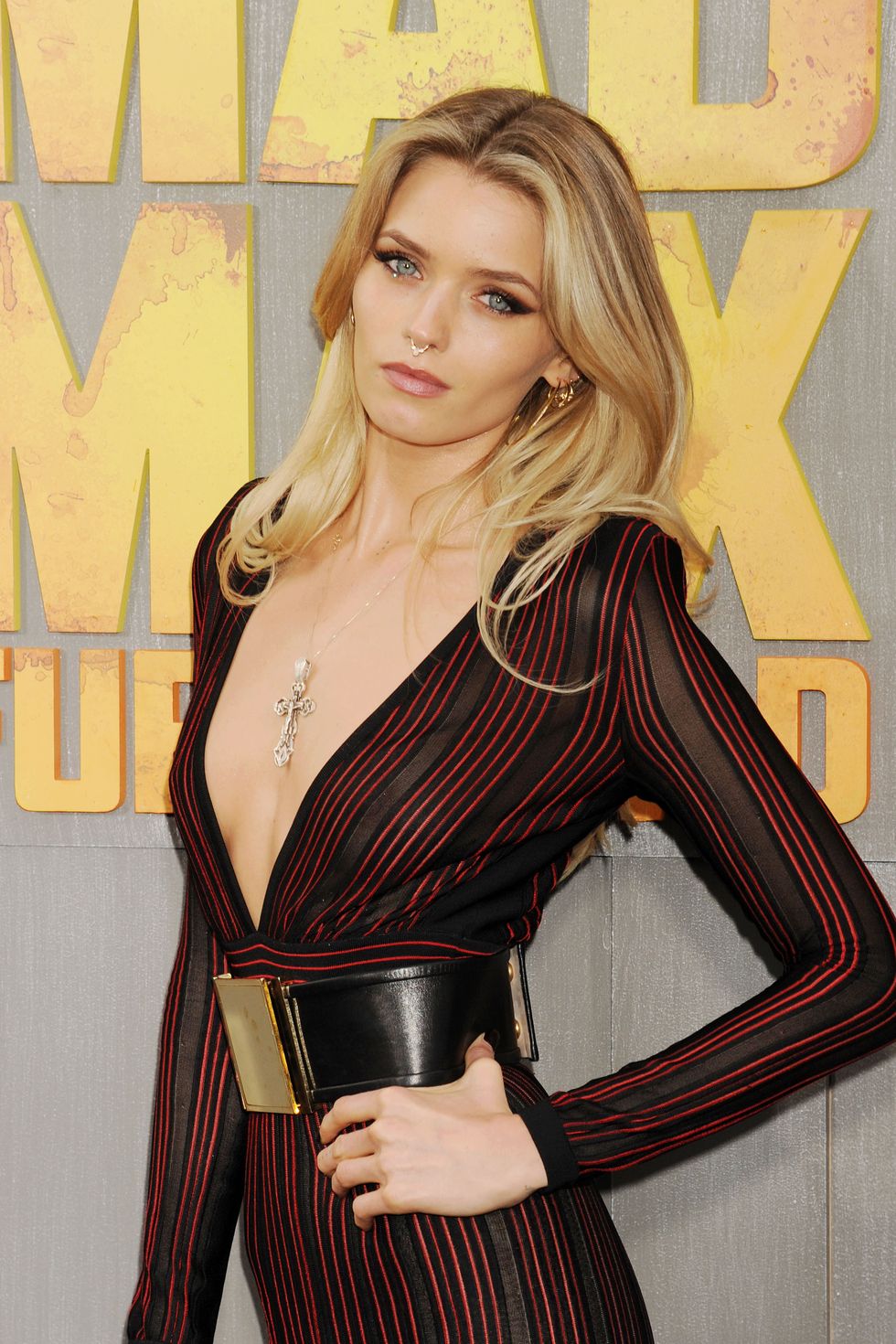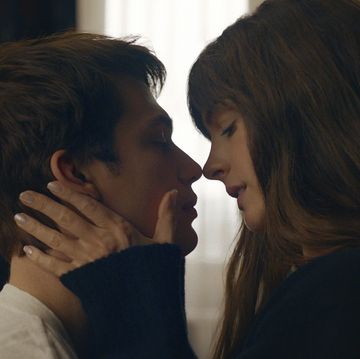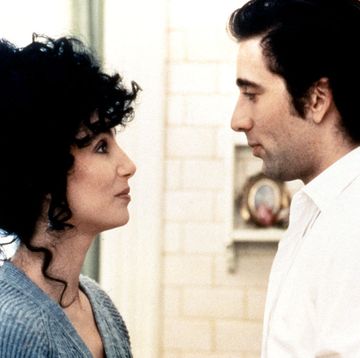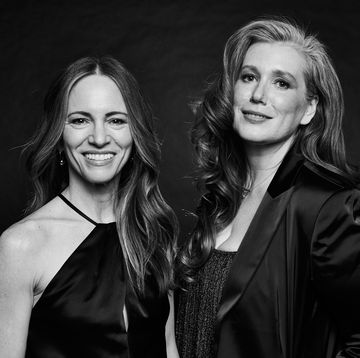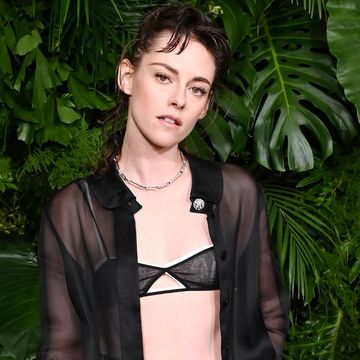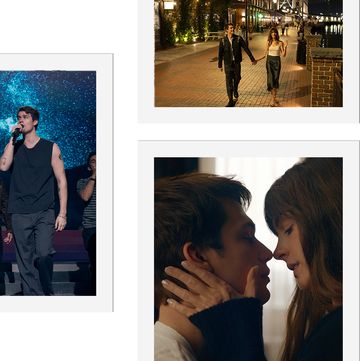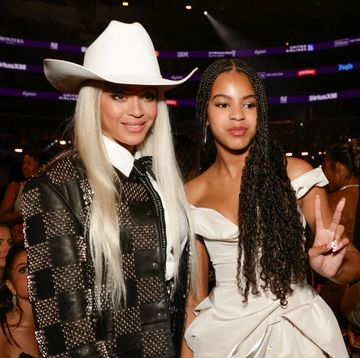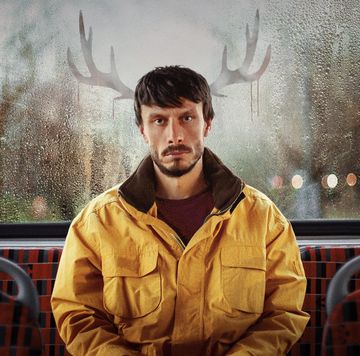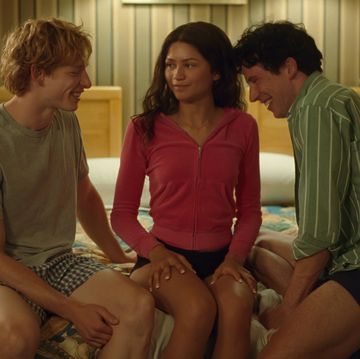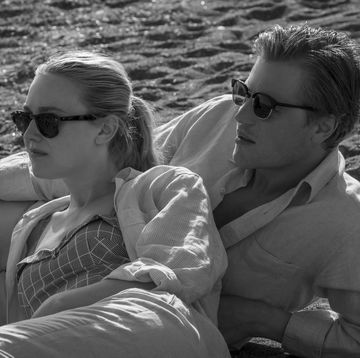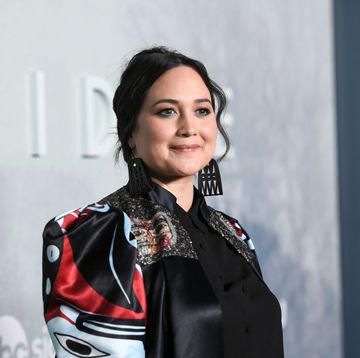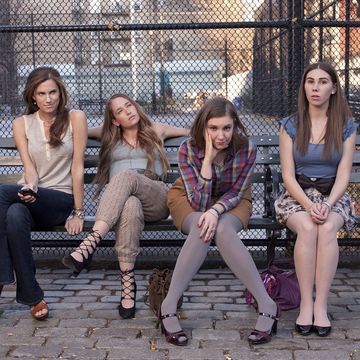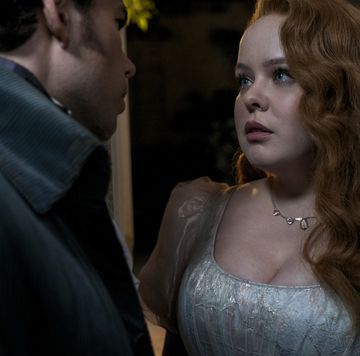Abbey Lee knew better than to get too deep into the mind of her Lovecraft Country character, Christina Braithwhite. But that’s the danger of embodying a dangerously powerful and bigoted sorceress, the Australian model-turned-actress says—one starts to learn from her.
“All women know that you deal with shit [from men] every day,” Lee tells BAZAAR.com. Though as one of the world’s formerly most coveted supermodels, she might know that fact more than most. “Whether it’s a wink from a dude down the street, or some guy who mansplained, you feel uncomfortable with a group of men. You know—‘You’re not smart enough.’ ‘Don’t wear that; you’ll draw attention.’ I didn’t realize how accustomed I’d become to dealing with that.”
So as she drove down the highway on her way to the set of Lovecraft Country one day, she had her so-called “Christina playlist” booming. She was getting into the zone for a powerful scene, and a passing truck driver looked her way and honked. She knew better than to glance at him; she really did. She told herself not to. But, who knows, maybe she had a flat tire, and he was trying to signal her. Maybe there was something dangerous on the road ahead. Maybe he was just a nice guy saying hello. So she made the ignorant choice. She looked.
Sure enough, he stuck his tongue between his two upright fingers, forming a grotesque V. He licked his lips and smiled. Lee felt her body temperature skyrocket. Color flooded the sharp cheekbones that made her a cover star several times over and a staple at every fashion week.
“It took every fiber of my being not to ram my car into the wheels of his truck,” she says. “It was insane, my impulse to smash my car into his truck. I was like, ‘It’s because Christina would have done that.’ She would have done it because she would have been protected, and she doesn’t give a fuck if he dies or not.”
Exploring the unexpected emotion welling up inside of her, she stopped the car. “Usually I’ll pretend [harassment] didn’t happen, or maybe I’ll cry because it really hurts me or whatever. But I’ve never had such a rageful response," she continued. "It was a little bit disturbing at times, where I was like, ‘Shit. Am I capable of doing that?’”
Lee may not be, but Christina, Lee’s first television role, definitely is. She’s the neglected daughter of a white supremacist cult leader with mysterious mystical powers, and though that angelic face might draw you nearer, she’s brilliantly wicked and entirely unafraid of consequences. She’s protected from harm. She lives like a goddess among men, using the series’s other characters, mostly those who are Black, to do her bidding.
There’s a lot Lee hates about this entitlement, this bigotry. But there’s something riveting about being Christina, who’s a gender-flipped version of a character from the novel source material by Matt Ruff. She’s a woman freeing herself from the consequences of being a woman. She is vengeful. And if she wants to go smashing trucks, you can guarantee she will.
BAZAAR.com sat down with Lee to better understand the nuances of this intense villain, why she left modeling behind, and how she approached playing a white supremacist in the age of the Black Lives Matter movement.
How did you get involved with Lovecraft? What did you know about it before you signed on?
It was a very basic, traditional way of booking a job. I was actually part of a second round of girls; after they screen-tested a bunch of girls that didn't work out, I got a recall. So I wasn't the favorite. I was kind of the underdog in the beginning. I was also replacing Elizabeth Debicki, who'd booked it a year beforehand. So I guess they were really on a deep search for the right Christina.
I was the last one to be cast too. So once I got hired, I had to pretty much be on a plane to Atlanta straight away. But on the plane from London to L.A., which is about a 10-hour flight, I read the Lovecraft Country book. I just read the whole novel back to front. Because I knew the show was based on that, and I didn't have the script. I had to try and figure out as much as I could just from reading the book.
What were your thoughts after finishing the book?
I just remember thinking, Dang, this is bonkers. I'm not a sci-fi reader, right? I wasn't aware of who H.P. Lovecraft was. I'm not a horror fan or a sci-fi fan. So this is not the type of book that I would have reached for. But I loved it. I loved the characters and the journey that they were going on. But it was hard to compare it to the script. I really fell so deeply in love with the scripts that Misha [Green] wrote. I locked myself in a hotel room for about two days and just read them back-to-back a number of times, because there's so much to take in.
You’ve previously criticized the lack of psychologically dynamic roles for women in Hollywood. Christina is an extremely psychologically complex character. What drew you to her?
I think it was just that she was so hard to pin down. On one hand, she was like a great liberator. She was offering to share power that she had gained through her own hard work and means. Yet at the same time as doing that, she was also oppressing the people that she was helping. She was also taking advantage of the people that she was helping. She was blackmailing them, manipulating them, undermining them, and using them to get more power. So I was like, ‘This is incredible. This person is living with such a duplicit place within herself. What drives that? Where does that friction in somebody come from? What feeds that friction?’ I focused heavily on her relationship with her father, with the cult that she's been brought up within, and with the lack of a mother.
I did a lot of research about growing up in a cult, growing up as a suppressed woman in the 1950s, growing up with a tyrannical father, with the loss of a mother. I just went really deep into trying to understand what formed this child and therefore formed the adult.
On top of that, she's also been built to be a bigot. She's been educated by a racist. So when you take all of those things and you concoct it into a woman who's highly intelligent, it becomes very complex.
You’ve described that stepping into this role was sometimes a disturbing experience for you. Can you elaborate?
I think what was maybe the most disturbing was how unapologetic she is. We all fantasize about what it would be like to live [like that]. Or maybe not everyone does, but I certainly have. If there was no shame, there were no repercussions to actions that you make, you couldn't be in prison for doing this or that. You wouldn't lose your family if you did this or that. If you just lived without all the barriers that get put on by society.
Our own inner moral compass helps us make decisions. Christina's is so out of whack. Christina has such an embellished level of entitlement that I have never gone into. I've never allowed myself to go as far as she's able to go. That's partly because she's brought up really privileged, very rich. Very caged too. She's protected from a lot of the world. She also has a certain amount of physical power that you'll find out about throughout the show, but it leaves her with a level of protection physically too. So she's able to live in this inconsequential way.
Some of the enjoyment that I got out of that was, it was like, 'Shit, did I just think that?'
You’ve talked at length about why you left your modeling career behind in favor of acting. What was the catalyst for you to finally focus on being an actress?
I was a child when I got asked to model. I was 14. I didn't understand what it was. I didn't understand what it was going to do to the trajectory of my life.
I didn't know what was going to be asked of my body. I didn't know how little choices I would have the power to make, purely because I was in an industry where models don't really have a voice. They certainly didn't when I was starting; it's a very different industry now.
I was an incredibly driven child with very big dreams and very big hopes. But I grew up in a very complicated household. I grew up in a very poor, poor, poor household. I wanted so badly to be something, to make something of myself. I just didn't know what. There was no music and art [in my home]; my family was more about how to put food on the table and survive.
So when I got asked to model, it was a ticket, and I got swept up. I just ended up in the cog. I was doing really well. I just happened to be gifted at modeling. From the minute someone put a camera on me, it was like I knew what to do. I think over time, as the years progressed ... I was just finding that there are a lot of things about the modeling industry that were not fitting with my constitution as a person.
My creative soul and my creative spirit and my brain were just being squashed and dulled down and numbed. There's only so much you can do as a model. I was just finding myself so frustrated and starved to utilize the creative spirit that I knew that I had in me. I started dating somebody who was a musician. I went on tour with him around the U.K. I was like, "Oh, my God, that's what I want to do."
So I went and bought an instrument from a little shop in a small town, and I started playing tambourine. Then I got an art studio, and I was painting a lot. I was painting and writing songs. I always felt like something was missing. I just kept asking whatever version of God it is that I believe in, to just, like, bring me the real thing. Then out of the fucking blue, I go off to audition for Mad Max: Fury Road.
I landed on that set, and I was like, "Shit, this is the Mecca of all the arts. This is, like, expression, sound, movement, performance." It's all the things that I love about all the other art forms put into one.
This summer is such an interesting time for this show to come out. You’re playing a fascinating character who also happens to belong to a white supremacist cult. How did you personally wrestle with and approach this role sensitively and wisely?
I felt like I had two jobs. I had one job of really informing myself about the topics that we're talking about. I'm like, "I need to know the facts about what's going on in society, what was happening then, and what's still happening now."
There was a lot of work that I did there to really dig deep into what was happening societally, and the racial injustices that are still happening today. So that was one job, to make sure that I was very aware of what I was working on and who I was working with.
But I had to remove that from playing Christina. Because my job as an actor, in the sense of getting into a character, is to tap into and express the humanity of that character without judgment. So you have to just look for, what is that person's need and how do they get what they want?
Show the truest form of the truest representation of a character like this. She happens to be a white supremacist. She happens to be an oppressor. She happens to be an unoppressed woman. But I have to remove it from how I feel about the things that are going on, because it's purely my job to make her as real as possible. Because the understanding of each other, I believe, is the biggest thing that promotes change: if we can understand each other.
This interview has been edited and condensed for clarity.
Lauren Puckett-Pope is a staff culture writer at ELLE, where she primarily covers film, television and books. She was previously an associate editor at ELLE.
